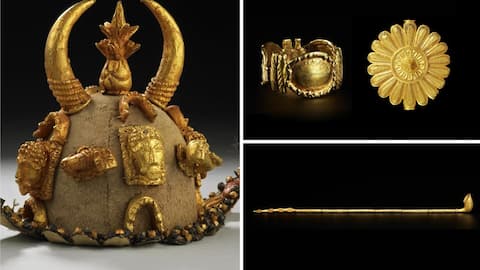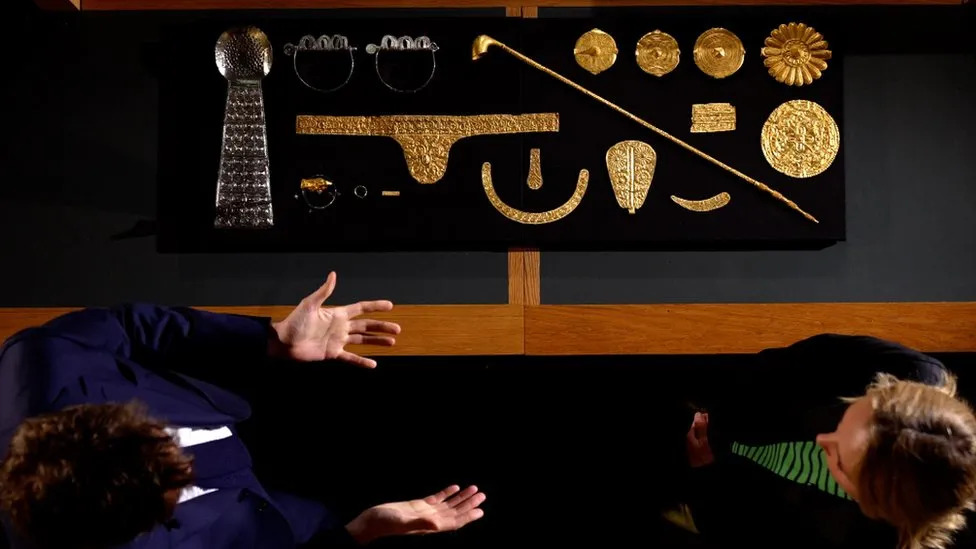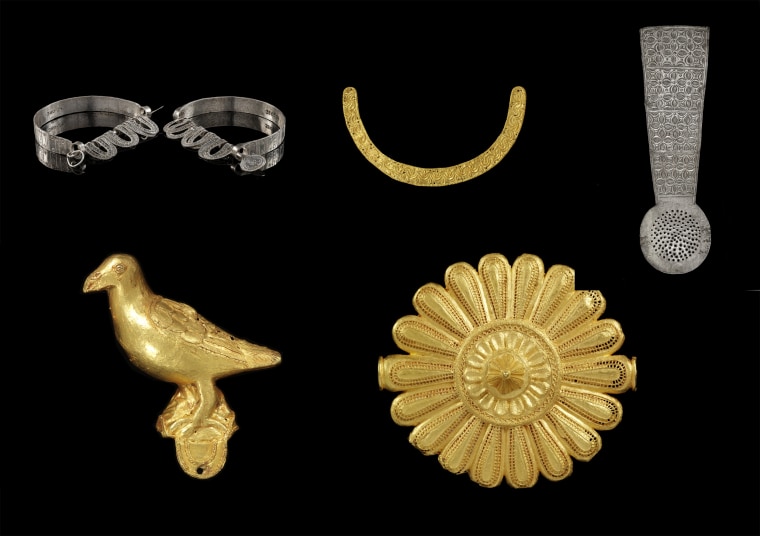
These artifacts bear significance for Ghana akin to the Benin Bronzes—thousands looted by Britain from the Kingdom of Benin's palace in modern-day Nigeria, a cause Nigeria has championed for decades.
Nana Oforiatta Ayim, Ghana's culture minister's special adviser, emphasized their spiritual importance, representing an integral part of the nation's soul. The loan marks a positive step on the anniversary of the looting, signifying healing and commemoration.
While UK museums possess numerous items from Ghana, such as a renowned gold trophy head, this loan serves as a starting point in addressing historical injustices.
The Asante, once a powerful West African state, thrived in trade, including gold, textiles, and enslaved people. Known for military might and wealth, their legacy endures, symbolized by the Asantehene's ceremonial gold-laden attire.
The European fascination with the Gold Coast, attracted by tales of African wealth, led to conflicts with the Asante in the 19th Century. The 1874 "punitive expedition" followed an Asante attack, resulting in the ransacking of Kumasi and the seizure of palace treasures.

The V&A is set to return several items acquired at a Garrards auction on April 18, 1874, including soul washers' badges (Akrafokonmu). These three heavy cast-gold items were worn by high-ranking court officials responsible for cleansing the soul of the king. The significance of these artifacts extends beyond mere wealth acquisition; their confiscation in the 19th Century served as a political act, aimed at removing symbols of government and authority.
Angus Patterson, a senior curator at the V&A, emphasizes that the acquisition was not solely about accumulating wealth. It involved a deliberate effort to erase symbols of government and authority, reflecting a nuanced political motivation behind the 19th Century acquisitions.
In addition to the V&A, the British Museum will also return a total of 15 items on loan, some of which were looted during a later conflict in 1895-96. Among these items is the Mpomponsuo, a sword of state. This collaborative effort marks a step towards addressing historical grievances and fostering cultural cooperation.
The return of these artifacts is not just a symbolic gesture but an acknowledgment of the broader historical context, including conflicts and colonial actions. As these items are returned on loan, they provide an opportunity for both nations to engage in meaningful discussions about cultural heritage, restitution, and the shared history between the UK and Ghana.
Additionally, there is a ceremonial cap, referred to as a Denkyemke, adorned with opulent gold ornaments. This cap was traditionally worn by senior courtiers during significant events such as coronations and major festivals.
The British Museum is also offering a cast-gold model lute-harp (Sankuo) on loan, which, notably, was not subjected to looting. This artifact serves to highlight its nearly two-century-old association with the Asantehenes.
The Sankuo holds historical significance as it was presented to the British writer and diplomat Thomas Bowdich in 1817. Bowdich remarked that it was intended as a gift from the Asantehene to the museum, symbolizing the wealth and status of the Asante nation.
Navigating the complexities of cultural restitution
Can one lend back objects to a nation that asserts theft? This proposal offers a pragmatic solution within UK legal constraints, though countries seeking historic justice may find it unsatisfactory.
The Parthenon Sculptures, known as Elgin Marbles in the UK, exemplify this dilemma, with Greece persistently urging their return. The British Museum's chair, George Osborne, seeks a practical way forward, exploring partnerships that, in essence, temporarily sidestep ownership disputes.
The agreement with the Asantehene mirrors this approach—a compromise feasible within British legal confines, acknowledging the complexity of ownership claims. While Nigeria might not entertain a loan for the Benin Bronzes, Ghana's government could face challenges accepting such an arrangement.
According to Mr. Hunt, these agreements between the V&A, the British Museum, and the Manhyia Palace Museum aim to "cut through the politics," initiating a conversation rather than a definitive resolution

Ms. Oforiatta Ayim, adviser to Ghana's culture minister, acknowledges potential anger over the loan concept, expressing the hope for eventual permanent returns to Ghana. She emphasizes the acknowledgment that these items were stolen in violent circumstances and rightfully belong to the Asante people.
The British government maintains a "retain and explain" stance for state-owned institutions, clarifying contested objects' context. Current legislation, anchored in the British Museum Act of 1963 and the National Heritage Act of 1983, prevents deaccessioning at specific high-profile institutions, a position unaltered by both Conservative and Labour parties.
Advocating legal reform, Mr. Hunt proposes granting museums more freedom with a procedural backstop—a committee to appeal restitution decisions. Concerns have been raised about potential loss of prized items, with some viewing it as a gateway to broader restitution debates.
Mr. Hunt counters by noting that very few items in the V&A's extensive 2.8 million-item collection have ownership disputes, emphasizing the nuanced nature of the proposal.

oncerns about contested items not returning after being loaned are swiftly addressed by Ghana's chief negotiator, Ivor Agyeman-Duah. He emphatically asserts the commitment to honoring agreements, dispelling fears of items being permanently retained by the borrowing institutions.
The Wallace Collection proudly houses significant Asante gold items, including a trophy head acquired at the 1874 auction. Similarly, the Royal Collection possesses noteworthy objects, such as a gold trophy head in the form of a mask, symbolizing defeated enemies. These artifacts, laden with historical significance, represent a complex narrative shaped by colonial acquisitions.
The potential exhibition of these items in Ghana's future remains uncertain, prompting Mr. Agyeman-Duah to approach the matter cautiously. While there is a desire to showcase these cultural treasures in their place of origin, the intricate logistics and considerations involved necessitate a careful and deliberate approach.
Britain's ongoing reckoning with its colonial legacy provides a backdrop to these cultural negotiations. Agreements of this nature, where items are loaned rather than permanently restituted, emerge as diplomatic and practical solutions to address historical grievances and pave the way for improved bilateral relationships, contingent on mutual acceptance of the agreed terms.
The delicate balance between preserving cultural heritage, acknowledging historical wrongs, and fostering collaboration underscores the nuanced nature of these agreements. As both nations navigate this intricate terrain, these cultural negotiations may serve as crucial steps towards addressing the past while laying foundations for a more constructive and harmonious future.
Source:
BBC NewsImage:
NBC News,
News Byte,
Sankfofa Online,
BBC NEWS